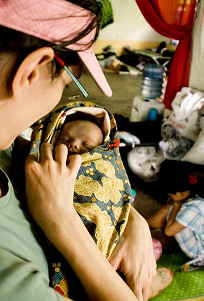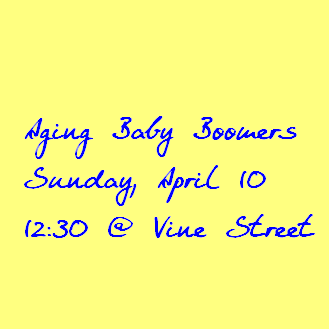Bonnie Carenen works with Church World Service in Indonesia. She and I never met in person, but a couple of years ago I read a series of excellent meditations for Advent she wrote when she was a Week of Compassion intern, and since then we have stayed in touch. Last week she wrote a brief update about the work she does in Indonesia.
Those of you who receive Week of Compassion updates via email, Twitter or Facebook may have read it; I also sent it to those of you who subscribe to our electronic prayer list (and I only mention this to remind you how easy it is these days to stay informed about the good work of Week of Compassion and Church World Service).
On a recent Saturday, Bonnie and her team were rained in in the town of Sikakap, the main city for aid distribution and relief work after the October 25 earthquake and tsunami in the Mentawai Islands. The sea was too rough to travel by boats, and the roads were too muddy for aid vehicles, even the trusted motorcycles Church World Service frequently relies on. So they spent the afternoon in the makeshift hospital into which the local Protestant church had been converted. More than one hundred patients and their families had been welcomed there and received treatment, and fortunately, many of them had recovered and found other places to stay.
They heard about one recent patient, an infant, whose parents both had died; rescue workers found him two days after the earthquake – still alive. No wonder the locals talked about him as the miracle baby, Baby Emmanuel. You’d think that if you wanted to write a brief article about your work in the aftermath of a natural disaster, and you heard this story about a little child who miraculously survived, and you’re told that the child’s name is Emmanuel, God with us – you’d think that would be plenty to write a moving Advent reflection on the urgency and promise of the work of Week of Compassion and Church World Service in a place of great need. But Bonnie started a new paragraph.
One young woman and her family were still at the hospital, living on rolled-out mats on the concrete floor of the church building. She had given birth at the hospital two months prematurely, just three days after the tsunami. She had lost her home in the disaster, and not just her home, but also her husband. Her child was seriously jaundiced and had to be treated at the nearest real hospital, on another island, more than twelve hours away by boat.
The mother was lost in her grief. The loss of her husband and home, and the premature birth of her baby had happened almost a month earlier, but her child still didn’t have a name. They all knew it wasn’t because there hadn’t been an opportunity for a proper christening or baptism – the young widow and first-time mother was severely traumatized and completely overwhelmed.
Somehow the mother’s friend overheard that Bonnie was a minister, and – imagine that – she asked her to name the child. Bonnie couldn’t believe she was serious, but she said, “I can’t name the baby unless the mother says it is okay.” Translating into the local language, the friend asked if it was alright, and the mother gave a short shrug, and said that was fine.
 The baby was a girl. How do you name a child that isn’t your own? It’s difficult enough to pick the right name for your own son or daughter – you want them to bear a strong name, one that becomes an anchor of their identity, a source of strength. But how do you name somebody else’s baby? Holding the child, Bonnie thought about the importance of a person’s name and what an honor it was to have been asked to name this girl. She looked at her and she asked her who she wanted to be and who she already was and how the world might be blessed through her.
The baby was a girl. How do you name a child that isn’t your own? It’s difficult enough to pick the right name for your own son or daughter – you want them to bear a strong name, one that becomes an anchor of their identity, a source of strength. But how do you name somebody else’s baby? Holding the child, Bonnie thought about the importance of a person’s name and what an honor it was to have been asked to name this girl. She looked at her and she asked her who she wanted to be and who she already was and how the world might be blessed through her.
And the name came to her. Amelia. This little girl would be Amelia, a name that means “to make better.” Bonnie describes her deep hope for this girl: May you make things better for your mother, your family, your entire community after the unimaginable loss they have endured. May you be a gift of hope, and may you find strength in that calling.
According to the local tradition, Amelia also needed a middle name. Bonnie continued to hold her, wondering what her middle name would be. She considered many of her favorite women in the Bible as well as women from her own life. She thought about this child’s birth in a church after her family’s life and community had been shaken and carried away by a wave. She thought about Advent, the season of expectation, the world’s waiting and wanting to be the world God created it to be. It was Saturday, and the next day another Advent candle would be lit, and the whole world was ready for the dawn of joy. “Joy will come in the morning,” Bonnie remembered the words from Psalm 30. Weeping may linger for the night, but joy comes with the morning. Amelia’s middle name will be Joy: the anticipation, expectation, and ultimate fulfillment of God’s promise.
Bonnie named the child by giving a name to our hope for the girl and her mother and their community. May Amelia be the gift that makes life better for them, and may the circumstances of her life continue to improve. Bonnie told the family that Joy means “holy happiness from God,” and now we pray for those who hold the little girl, and sing to her, and feed and bathe and rock her, that she will remind them every day of the miracle of Emmanuel, God with us.
I told Bonnie that we would hold Amelia Joy in our prayers and, better yet, that we would put her in the crib with the little boy from Bethlehem. We go to Bethlehem and we gently lay our hope in the cradle that holds God’s salvation – our hope for the world, our hope for all the children born into it, and our hope for a peace that excludes no one, not even the dead. We lay our hope next to Jesus who came to save us from our sins, and who is with us always, to the end of the age.
We go to Bethlehem, because that is where, according to Luke and Matthew, the story begins. For Luke, it’s all about Mary. Mary is visited by the angel Gabriel. Mary asks good questions. Mary says yes to God’s wondrous plan. Mary sings the exuberant words we spoke together in worship. Joseph? He stands on the edge of the scene.
But Matthew tells the whole story differently. For Matthew, the story begins when Mary is found to be with child before she and Joseph lived together. Nobody sings in the first chapter of Matthew. The spotlight is on Joseph, a good man whose world just fell to pieces. All he knows is that Mary is pregnant, and that the child isn’t his.
Joseph faced a serious dilemma. On the one hand, he needed to consider the demands of the law of the God he loved. On the other hand, he needed to consider Mary, the young woman he loved. In those days, you couldn’t just cancel the wedding and take the ring back to the jeweler for a refund. Publicly filing for a divorce meant condemning Mary to life-long shame. Accusing her of adultery might also have resulted in some hot heads demanding that she be stoned to death (Deuteronomy 22:21, 23), and Joseph didn’t want anything like that to happen. Yet the law, the honor of his family, and his personal honor required that he break off the engagement. So Joseph chose of all the options he had the most loving one: he would dismiss her quietly.
I imagine that he was completely exhausted after looking, from every possible angle, at the mess his hopes and dreams had become. Just when he had decided what he would do to honor both the law of God and the love he shared with Mary, he fell asleep. And in his sleep, a messenger from God spoke to him; this was an option not written in the law, an option even his love could not envision: “Joseph, son of David, do not be afraid to take Mary as your wife, for the child conceived in her is from the Holy Spirit. She will bear a son, and you are to name him Jesus, for he will save his people from their sins.” Do not be afraid. This child is entirely God’s initiative. Mary will bear a son, and you are to name him.
Joseph didn’t say a word, but he said ‘yes’ with his life to God’s saving initiative. He took Mary as his wife and he named the little boy Jesus.
You know what it’s like when your dreams crumble, not necessarily in an earthquake or under a tsunami wave – but it can feel just like that, overwhelming. Your plans in pieces, you find yourself presented with circumstances you did not, would not choose. You don’t know how it happened, let alone why, and all you can think about is how to get away from what has become of your life. You are so exhausted and tired, you can’t think of a name for your hope.
Matthew tells us that’s the moment when Joseph heard the voice of an angel, “Don’t be afraid. God is faithful and true and at work. Say yes. Don’t be afraid.” And Joseph believed the messenger and laid his hope in the cradle and he gave it the name he gave his son, Jesus.
Joseph said ‘yes’ with his life, and Mary said ‘yes’ with hers, and the Messiah was born. And as we get ready for Christmas, that’s all we do as well: learn to say ‘yes’ with our lives to God’s desire to save and heal and make whole. We learn to give a name to our hope. A strong name, one that rhymes with Emmanuel and Amelia.
 All are welcome from 9:30-10:30 in the Fellowship Hall as Ted Parks and Jack Wallace lead an interactive discussion based on the book Renewing Christian Unity, authored by Vine Street’s own Gary Holloway and others.
All are welcome from 9:30-10:30 in the Fellowship Hall as Ted Parks and Jack Wallace lead an interactive discussion based on the book Renewing Christian Unity, authored by Vine Street’s own Gary Holloway and others.
















